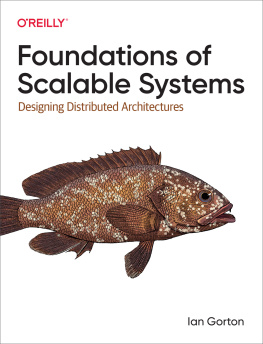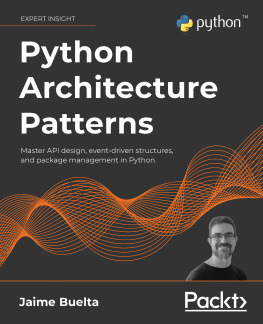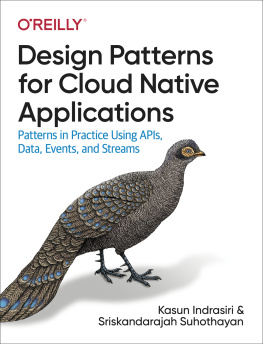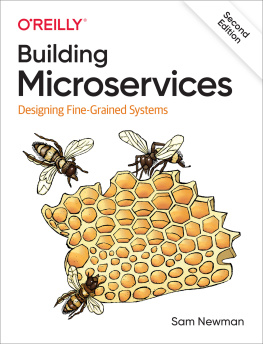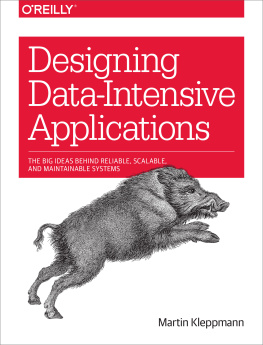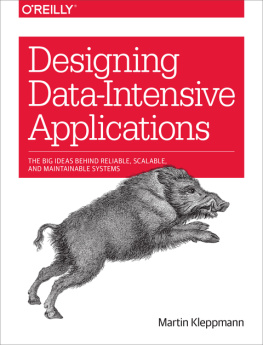Praise for Foundations of Scalable Systems
Building scalable distributed systems is hard. This book just made it easier. With topics ranging from concurrency and load balancing to caching and database scaling, youll learn the skills necessary to make your systems scale to meet the demands of todays modern world.
Mark Richards, Software Architect, Founder of DeveloperToArchitect.com
Through lively examples and a no-nonsense style, Professor Gorton presents and discusses the principles, architectures, and technologies foundational to scalable distributed systems design. This book serves as an essential modern text for students and practitioners alike.
Anna Liu, Senior Manager, Amazon Web Services
The technology in this space is changing all the time, and there is a lot of hype and buzzwords out there. Ian Gorton cuts through that and explains the principles and trade-offs you need to understand to successfully design large-scale software systems.
John Klein, Carnegie Mellon University Software Engineering Institute
Scalability is a serious topic in software design, and this book provides a great overview of the many aspects that need to be considered by architects and software engineers. Ian Gorton succeeds in striking an excellent balance between theory and practice, presenting his real-life experience in a way that is immediately useful. His lighthearted writing style makes for an enjoyable and easy read, with the occasional sidetrack to explain things like the link between software architecture and Italian-inspired cuisine.
Eltjo Poort, Architect, CGI
In the era of cloud computing, scalability is a system characteristic that is easy to take for granted until you find your system hasnt got it. In this book, Dr. Ian Gorton draws on his wide practical, research, and teaching experience to explain scalability in a very accessible way and provide a thorough introduction to the technologies and techniques that are used to achieve it. It is likely to save its readers from a lot of painful learning experiences when they find that they need to build a highly scalable system!
Dr. Eoin Woods, CTO, Endava
Dealing with issues of distributed systems, microservice architecture, serverless architecture, and distributed databases makes creating a system that can scale to support tens of thousands of users extremely challenging. Ian Gorton has clearly laid out the issues and given a developer the tools they need to contribute to the development of a system that can scale.
Len Bass, Carnegie Mellon University
Trade-offs are key to a distributed system. Professor Gorton puts out great explanations with real-life scenarios for distributed systems and other key related areas, which will help you develop a trade-off mindset for making better decisions.
Vishal Rajpal, Senior Software Development Engineer, Amazon
This is the book to read, whether youre a distributed systems learner or an experienced software engineer. Dr. Gorton brings together his decades of academic research and cloud industry case studies to equip you with the key knowledge and skills you need to build scalable systems and succeed in the cloud computing era.
Cong Li, Software Engineer, Microsoft
Foundations of Scalable Systems
by Ian Gorton
Copyright 2022 Ian Gorton. All rights reserved.
Printed in the United States of America.
Published by OReilly Media, Inc. , 1005 Gravenstein Highway North, Sebastopol, CA 95472.
OReilly books may be purchased for educational, business, or sales promotional use. Online editions are also available for most titles (http://oreilly.com). For more information, contact our corporate/institutional sales department: 800-998-9938 or corporate@oreilly.com .
- Acquisitions Editor: Melissa Duffield
- Development Editor: Virginia Wilson
- Production Editor: Jonathon Owen
- Copyeditor: Justin Billing
- Proofreader: nSight, Inc.
- Indexer: nSight, Inc.
- Interior Designer: David Futato
- Cover Designer: Karen Montgomery
- Illustrator: Kate Dullea
Revision History for the First Edition
- 2022-06-29: First Release
See https://oreil.ly/scal-sys for release details.
The OReilly logo is a registered trademark of OReilly Media, Inc. Foundations of Scalable Systems, the cover image, and related trade dress are trademarks of OReilly Media, Inc.
The views expressed in this work are those of the author, and do not represent the publishers views. While the publisher and the author have used good faith efforts to ensure that the information and instructions contained in this work are accurate, the publisher and the author disclaim all responsibility for errors or omissions, including without limitation responsibility for damages resulting from the use of or reliance on this work. Use of the information and instructions contained in this work is at your own risk. If any code samples or other technology this work contains or describes is subject to open source licenses or the intellectual property rights of others, it is your responsibility to ensure that your use thereof complies with such licenses and/or rights.
978-1-098-10606-5
[LSI]
Preface
This book is built around the thesis that the ability of software systems to operate at scale is increasingly a key factor that defines success. As our world becomes more interconnected, this characteristic will only become more prevalent. Hence, the goal of this book is to provide the reader with the core knowledge of distributed and concurrent systems. It also introduces a collection of software architecture approaches and distributed technologies that can be used to build scalable systems.
Why Scalability?
The pace of change in our world is daunting. Innovations appear daily, creating new capabilities for us all to interact, conduct business, entertain ourselveseven end pandemics. The fuel for much of this innovation is software, written by veritable armies of developers in major internet companies, crack small teams in startups, and all shapes and sizes of teams in between.
Delivering software systems that are responsive to user needs is difficult enough, but it becomes an order of magnitude more difficult to do for systems at scale. We all know of systems that fail suddenly when exposed to unexpected high loadssuch situations are (in the best cases) bad publicity for organizations, and at worst can result in lost jobs or destroyed companies.
Software is unlike physical systems in that its amorphousits physical form (1s and 0s) bears no resemblance to its actual capabilities. Wed never expect to transform a small village of 500 people into a city of 10 million overnight. But we sometimes expect our software systems to suddenly handle one thousand times the number of requests they were designed for. Unsurprisingly, the outcomes are rarely pretty.
Who This Book Is For
The major target audience for this book is software engineers and architects who have zero or limited experience with distributed, concurrent systems. They need to deepen both their theoretical and practical design knowledge in order to meet the challenges of building larger-scale, typically internet-facing applications.
What You Will Learn
This book covers the landscape of concurrent and distributed systems through the lens of scalability. While its impossible to totally divorce scalability from other architectural qualities, scalability is the main focus of discussion. Of course, other qualities necessarily come into play, with performance, availability, and consistency regularly raising their heads.

